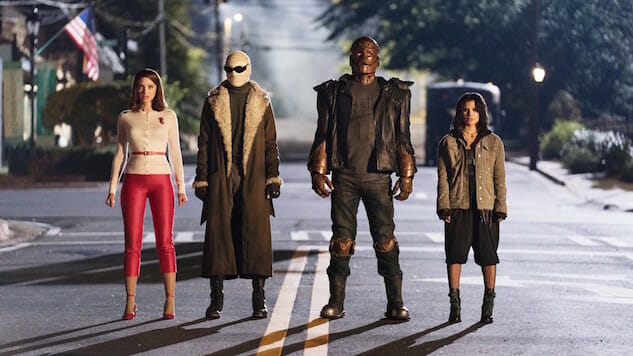The Weird, Tragicomic Doom Patrol Shows How DC Can Compete in the Superhero Arms Race
Photo: DC Universe
“Critics, what do they know? They’re gonna hate this show.” DC Universe rolled the dice with this line, but despite its tongue-in-cheek self-deprecation, it has its first good live-action show—and it’s all thanks to taking risks. After the dismally grimdark Titans got more and more chipper—or at least varied—as it introduced its DC Universe teammates, Doom Patrol brightens up the streaming service’s offerings with lovable idiots and their tragic backstories. Compared to tragic idiots with tragic backstories, this is a huge step up. Featuring Elasti-Woman (April Bowlby), Crazy Jane (Diane Guerrero), Cyborg (Joivan Wade), Robotman (Brendan Fraser), The Chief (Timothy Dalton), and Negative Man (Matt Bomer), the team is staffed by the goofballs, the screw-ups—the “losers” of the DCEU, as the opening voiceover puts it—and this unique tone is the way DC can keep up in the superhero arms race.
The third-tier answer to Marvel’s Guardians of the Galaxy, Doom Patrol has learned plenty from its scrappy counterpart, taking as much away from that franchise’s ragtag group of space pirates/superheroes as it does the DC series with a senses of humor. The CW’s Legends of Tomorrow and Cartoon Network’s hyper, strange, and hyper-strange Teen Titans Go! have been dark horse TV success stories, with the latter earning its own (very fun!) movie and the former improving consistently over the course of its four seasons. Doom Patrol carves its own tonal niche, balancing the self-referentiality of Go!, the tragedy of Titans, and the ridiculousness of Legends. Bolstered by Fraser’s easy charm and some knockout acting by Dalton, Doom Patrol stakes its claim as DC’s best streaming option—simply because it understands and subverts expectations with its unique mix: It’s not just funny, it’s not just sweet, and it isn’t afraid to push the boundaries on either.
Elasti-Woman has gross-out slapstick thanks to her malleable physiology and at the expense of her vanity. Negative Man can stop functioning any time the mysterious force within him decides, leading to plenty of limp, full-body flops. Robotman can’t even move his mouth as profane reactions stream from his stoic face. Robotman and Negative Man’s physical actors—Riley Shanahan and Matthew Zuk, respectively—do plenty of fun pantomime to help out the famous voices behind the tragic bodies. And it’s all funny.
It’s even funny at the expense of its characters’ tragedies—or its actors’ real-life tragedies, as Fraser’s Robotman is groped by Crazy Jane, echoing Fraser’s claims about the head of the Hollywood Foreign Press Association. OK, so far, Crazy Jane is terrible. Multiple-personality characters are a recipe for disaster even when every personality isn’t…that. (Think Split, but with more than 50 new and exciting ways to cringe.) But the idea is still smart, if not the execution. The approach can be shocking, but it also carries a sense of ownership. It’s the same black humor wielded by those with terminal illnesses: As Negative Man says, “That was a joke meant to make you feel more comfortable with my appearance.” It suits the show much better than the quippy confidence of action heroes or the in-between shock-jockiness of Deadpool.
-

-

-

-

-

-

-

-

-

-

-

-

-

-

-

-

-

-

-

-

-

-

-

-

-

-

-

-

-

-

-

-

-

-

-

-

-

-

-

-








































